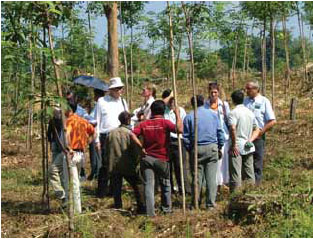FEATURES: Regional Watershed Management

At the Greater Mekong Sub-Region Ministerial Meeting in Manila, in June 2007, the results from an evaluation of the first 15 years of GMS activities were presented. One of the most noteworthy outcomes reported was that hardware investments (i.e. infrastructure) need more support from software investments (in capacity development) to achieve positive and sustainable impact.
This theme was adopted as the main topic of discussion at the 2007 Regional Consultation Meeting on Watershed Management in the Lower Mekong Basin, held in Vientiane in November. The meeting, hosted by the MRC-GTZ Watershed Management Project, part of the MRC’s Agriculture, Irrigation and Forestry Programme, brought together stakeholders from the Member States, international experts and observers, and alumni from the University of Cologne and other German universities. Their brief was to share views on which capacity development activities are needed to underwrite investments with a watershed management focus.
Over the three days of the meeting delegates from Cambodia, the Lao PDR, Thailand and Viet Nam shared knowledge and experience of watershed management, and discussed policy, institutional and human resource development issues. All three topics are closely related and are crucial for future watershed management development. Human development means the process through which people, organisations and society as a whole create, strengthen, adapt and maintain human potential over time. Policy development determines the mandates, roles and responsibilities of institutions relevant to watershed management. Institutional development determines the tasks and skills of the professional staff in institutions with responsibility for watershed management.
The first day was devoted to discussion of watershed management policies and regulations in each of the four countries. The overriding topic of the second day was institutional development: to ensure wise management of watersheds, there is a need for institutions that support participatory decision-making and the formulation of priority issues. This is complicated by the cross-administrative border and cross-sector nature of watershed management. The relationship between watershed and river basin management requires special attention, as does the cumulative impact of watershed management on the overall health of the Mekong River Basin. On the third day participants went out on a field trip to the Nam Ton pilot watershed in Vientiane Province. There, at the mouth of the Nam Ton, discussion continued on the ecological integrity and connectivity of streams, before the group moved on to the banks of the Mekong River to address transboundary issues.
According to the summaries given in the final session of the meeting, the participants felt that the exercise had been successful, and the project organisers too were satisfied that momentum had been achieved in the dialogue process. Delegates said that highlights of the meeting included the presentations of the achievements made in Australia’s Murray-Darling Basin and in the Danube region. However, while the riverbasin organisations at work in those places have 25 years of experience in watershed management, the story in the Mekong Basin has been rather different: only four years ago watershed issues were considered private national business. Since then, there has been something of a shift towards policy and institutional development. There is now much more sharing and learning exchange in these vital areas, which can only be of benefit to all the people in the Mekong Basin.
A distinctive feature of the Regional Consultation Meeting was the presence of over 40 alumni from German universities. These former students observed the meeting as guests of InWEnt and DAAD, co-sponsors of the event and long-term investors in capacity building across Asia. The alumni came from the LMB states, but also from Bangladesh, Indonesia and Myanmar. After the meeting was concluded the DAAD and InWEnt alumni met for their own two-day seminar to exchange the experience in watershed management and rural development gained in the years since they had returned home, after completing their studies in Germany.
Choose a newsletter: